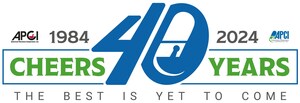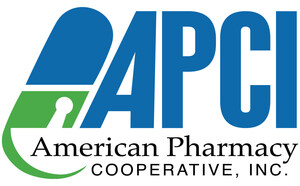BESSEMER, Ala., Aug. 3, 2022 /PRNewswire/ -- Current Congressional efforts to reduce drug prices for Americans are laudable, but the latest proposals in the current Senate reconciliation bill – while addressing some major concerns – disregard a major flaw in our healthcare system, officials with American Pharmacy Cooperative, Inc. (APCI) said today.
Proposals detailed in the Inflation Reduction Act of 2022 (H.R. 5376) to cap out-of-pocket costs for seniors in Medicare Part D and to allow the Centers for Medicare and Medicaid Services to negotiate directly with drug makers for some high-cost pharmaceuticals are admirable. However, these provisions in the reconciliation bill are bandages on a broken prescription drug pricing system in the United States. No effort to "right the ship" can be complete if it does not address anticompetitive pharmacy benefit manager (PBM) practices that increase prescription drug prices and restrict patient choice and access to care.
"PBMs are among the richest corporations on earth and they play a central role in the price of and access to prescription drugs," said APCI CEO Tim Hamrick. "We commend the Senate for its efforts to make prescription drugs more affordable for all Americans in the current reconciliation bill. But to do that, Congress should focus on PBM practices which continue to drive prescription price increases and keep patients from affording the lifesaving drugs that they need."
To effectively combat rising prescription drug costs and the lack of transparency in America's prescription pricing system, Congress should:
- Rein in abusive PBM practices and implement a transparent drug pricing model in Medicare Part D;
- Reform Medicaid managed care including prohibiting PBM spread pricing; and
- Preserve the rebate rule.
The problems with the American drug pricing model are systemic and fueled in large part by PBMs. Seeking to empower CMS to negotiate drug prices directly with drug makers is a tacit admission that entrusting PBMs to negotiate lower drug prices is failed policy.
A 2022 study by 3 Axis Advisors ("Deserving of better: How American seniors are paying for misaligned incentives within Medicare Part D") revealed how a large Part D plan raised prices for generic medications for seniors by 51 percent in a 30-month period – despite actual pricing for the same medications declining by 8.7 percent during the same time frame. The study also found potential savings of $18.7 billion in Part D in one year alone by removing the PBMs' ability to play drug pricing games and moving to a market-based pharmacy reimbursement model via paying pharmacy at the National Average Drug Acquisition Cost (NADAC) plus a $10 dispensing fee.
"The 'non-interference clause' in Medicare Part D has empowered PBMs to engage in unfair practices and pricing manipulation free of CMS oversight," said APCI's Director of Healthcare Policy Greg Reybold. "Our recommendations are to rein in abusive PBM practices such as patient steering and underwater reimbursements to community pharmacies and to move toward a market-based model in which drug prices are based on pharmacy acquisition costs and not artificially inflated PBM pricing."
"PBMs have played a large role in Medicare Part D since the program's inception and two things have happened," added APCI Director of Government Affairs Bill Eley. "Drug prices have risen and PBM profits have soared. For an industry whose existence is predicated on saving money for patients, PBMs seem to be doing a horrible job. It's time for Congress to act."
PBM-negotiated "rebates" from drug manufacturers are excluded in the CMS definition of "negotiated price," which means that when a PBM negotiates a rebate neither the PBM nor the prescription drug plan is required to pass on those savings to America's seniors at the pharmacy counter. These rebates drive "pay to play" formulary decisions, drug steering, and brand drug mandates.
These practices have not gone unnoticed by the U.S. Federal Trade Commission (FTC), as demonstrated by the commission's recently announced study of PBM practices and a new policy statement on rebate practices that exclude lower cost drugs.
"That Congress would entertain a permanent repeal of the rebate rule at a time when PBM rebate practices are a target of the FTC – and when the rule's implementation had already been delayed – is deeply concerning," Reybold said. "The outsized role PBM-extracted drugmaker rebates play in today's broken prescription drug system should compel action, not give PBMs a pass to engage in business as usual."
Previous versions of Congress' prescription drug pricing legislation looked to reform PBM practices in Medicaid managed care by implementing a market-based reimbursement model using the NADAC pricing benchmark, along with a ban on spread pricing and requiring pharmacies to report their drug purchases to NADAC. These solutions would save taxpayers billions of dollars while at the same time increasing transparency and paying pharmacies fairly for the prescriptions they dispense.
"Medicaid managed care reform isn't complicated, and it's the right thing to do," Eley said. "It makes sense for taxpayers and for America's community pharmacists who continue to be exploited while PBMs and managed care companies siphon off billions of taxpayer dollars to feed their corporate profits via spread pricing practices."
APCI is a member-owned cooperative of more than 1,600 member pharmacies in 30 states. Established in 1984 and headquartered in Bessemer, Ala., APCI is proud to lead the fight for prescription drug pricing transparency and reform.
SOURCE American Pharmacy Cooperative, Inc.

WANT YOUR COMPANY'S NEWS FEATURED ON PRNEWSWIRE.COM?
Newsrooms &
Influencers
Digital Media
Outlets
Journalists
Opted In






Share this article